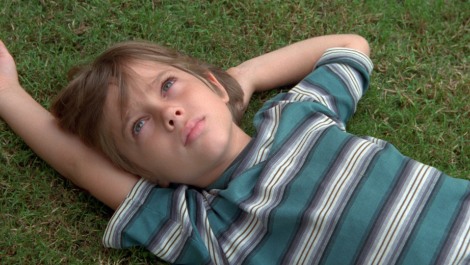Boyhood

For all his affection towards the laid-back, lackadaisical and dispossessed, Richard Linklater has never been a slacker. While he tends to tell relatable, human tales, he often peacefully experiments with form: check out the Before trilogy’s decades-spanning romance, Bernie’s blurring of fact and fiction and the one-room dramatics of Tape, if you need evidence.
Boyhood is easily his most ambitious film yet, and should see him graduate to the top rank of modern directors. Filmed in annual bursts over a 12-year period, its USP is the chance to watch Mason (Ellar Coltrane) age gradually from six-year-ancient kid to the high classes student, while the tribulations of his family play out in the social class. While the gimmick might hook you in, this is much more than a time-lapse experiment to gawp at.
The concept is bold, but the film itself is the opposite of showy. The transitions aren’t marked by title cards, fancy cuts or ‘We Like The ’00s’ style musical cues – they just take place, with haircuts and subtle growth spurts speaking volumes. The opening hums with a few era establishing contemporary pop-rock anthems, but after that you’ll only get the occasional cultural reference (thanks, Aggravate Potter) or a long since discontinued gadget (remember the Gameboy Advance?) to get your bearings. Even foremost global news events, like Obama’s campaign for presidency, sit in the social class.
Ditching any semblance of a three-act structure, arcs ebb and flow with a casual volatility. At the starting point, Ethan Hawke’s Mason Sr is an enthusiastic but unreliable absentee father, and Patricia Arquette’s release mum Olivia is heading back to the high classes for a original start. Both actors are career-best, with Arquette the most likely to see deserving awards nods. One constant is Liv’s string of unpleasant other halves; fleetingly unpleasant intrusions that become a painfully perpetual sequence (an early dinner desk scene erupts with especially resonant unpleasantness). Hawke always does his best work with Linklater, and that holds right here.
It’s impossible to divorce Coltrane from his on-screen assumed role, to gauge the boundary he’s acting. With the script developing on the hoof, there’s the sense that Coltrane will have shaped the film as much as it shaped him. Credit is also due to Linklater for resisting the urge to over-dramatise, letting the ups and downs of adolescence emerge naturally. During his younger years, Mason’s more likely to be found staring off into the sky than really really doing anything. He’s not a genius, a rebel, a jock. He’s a kid who probably spends too much time playing videogames.
Mirroring life, Mason’s parents become less of a focal point as he enters his teens. New schools, new friends and first likes come to the fore, as his own identity becomes more defined. Growing up alongside Mason is Linklater’s own daughter Lorelei, as sister Samantha, her early brattiness providing a contrast with Mason’s placid slouch.
Much of the real meaty stuff happens within Mason’s peripheral vision – glimpsed through a crack in the bedroom door, or out of a car window. Despite the fact the report traces a kid’s formative years, the evident rites of passage tend to occur off-screen, with the film filling in the blanks with more intimate moments. The one slightly jarring moment of across-the-years coincidence concerns a insignificant supporting player.
Clocking in at 166 minutes, you’ll feel like you’ve spent a hell of a lot longer with these characters (and it’s rare that’s a compliment). As the years roll on, the genuine ageing of the actors paired with the subtlety of the performances make for an uncanny sense of familiarity, and the evidently accurate-knit bond between the cast adds further depth.
As Linklater’s unfussy lensing and pared-back style puts the focus firmly on the characters, by the end you feel like part of the extended family. It’s like experiencing a huge slice of life, but it never feels like a documentary – Linklater’s artful precision crafting something that feels closer to a novel than a habitual film. You certainly can’t accuse him of slacking. For a project of such scope, the extras are slim: the Blu-ray alone comes with a solo Making Of doc.
![]()












